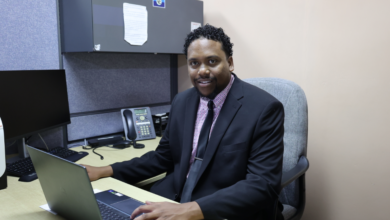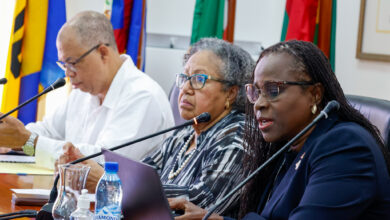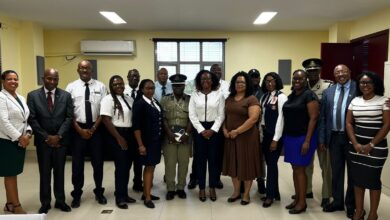Representatives of the Georgetown-based Caribbean Community (CARICOM) Secretariat recently visited East Berbice/Corentyne, Guyana, as part of efforts to strengthen relations with the Guyanese community.
The team of officials visited the locally and internationally acclaimed Non-Governmental Organisation (NGO), St. Francis Community Developers (SFDC) to observe the organisation’s work.
The mission was led by Ambassador Douglas Slater, Assistant Secretary-General, Directorate of Human and Social Development, at the invitation of Mr. Alex Foster, SFDC’s Chief Executive Officer. He guided the Secretariat’s team, including Ms. Yldiz Pollack-Beighle, Deputy Programme Manager, Youth Development; Ronnie Brathwaite, Deputy Programme Manager Agriculture Development; and staff of the Communications Unit, to visits to several umbrella organisations sheltered by SFDC.
Foster, who has been involved in community development for almost three decades, said he was keen on hosting the CARICOM Secretariat to begin the groundwork of sharing his experiences with grassroots community development among CARICOM Member States.
He explained that the Commonwealth Youth Programme (CYP), which has been decommissioned in Guyana, had facilitated several exchanges among his NGO and youth programmes in the Region. He requested that the CARICOM Secretariat fill the void that has been created by the absence of the CYP.
Dr. Slater told Mr. Foster that the CARICOM Secretariat had been following the work of St. Francis and the visit to Region 6 had provided a tangible understanding of the scope of the NGO’s work.
SFDC supports the work of the Police Training College in Berbice and 54 community development groups which are involved in Early Childhood Education and Care; skills training for rural youth in agriculture and in-land aquaculture, culinary arts, information technology, reading; parenting; response to HIV/AIDS, domestic violence, suicide and substance abuse; and small business development.
In his engagement with stakeholders from those groups, Dr. Slater noted that the issues to which they responded, fell under the remit of the Directorate of Human and Social Development of the CARICOM Secretariat. He said that while their work in Region Six was critical to the local community, they were a part of the wider Caribbean Community. Observing that a “disconnect” existed between them and the CARICOM Secretariat, Dr. Slater said the purpose of his visit was to begin to bridge that gap.
He told the recruits at the Felix Austin Police College in Berbice that as security officers in training, they were critical to CARICOM, which had taken security seriously in establishing it as the fourth pillar.
We have a keen interest in the development of our youth and the work that you do which is national security. Crime is one of the big challenges in many Member States among the youth and you have started addressing this challenge,” Dr. Slater told the young police recruits.
Encouraging the security recruits he said: “It is really pleasing to see that you have the interest in making this your career, distinguishing yourself as a much more disciplined person. After training it is less likely that you, your relatives, and friends should become involved in crime, not only because of your profession but also your interaction with them. The nation will depend on your activities because its holistic development – economic and otherwise – depends on a very stable environment with low crime. We would like to have no crime, but that is virtually impossible. It is going to be your job to minimise crime.”
Ambassador Slater had similar interactions with the youth and managerial personnel at the Mibicuri Community Developers, Black Bush Polder; the Black Sharks Basket Ball Team, Fyrish Village; the All Saints Presbyterian Developmental Centre and Multi-Purpose Agriculture Farm, New Amsterdam; the St. Marks Anglican Mother’s Union Life and Skills Centre, Alness Village; and the Shining Star Community Developers, Limlair Village. He saw community development programmes which featured integrated farming including tilapia rearing, poultry farming and cash crop production that utilised the water conversion practice, drip irrigation. He also interacted with the orchestra of the All Saints Presbyterian Developmental Centre that treated the Secretariat’s team to skillfully-played Christmas and Guyana national songs.
Dr. Slater assured the groups that the visit would not be the last from the CARICOM Secretariat, and added that it should become a regular feature as a closer relationship is forged with Region Six and the wider Guyanese society.






